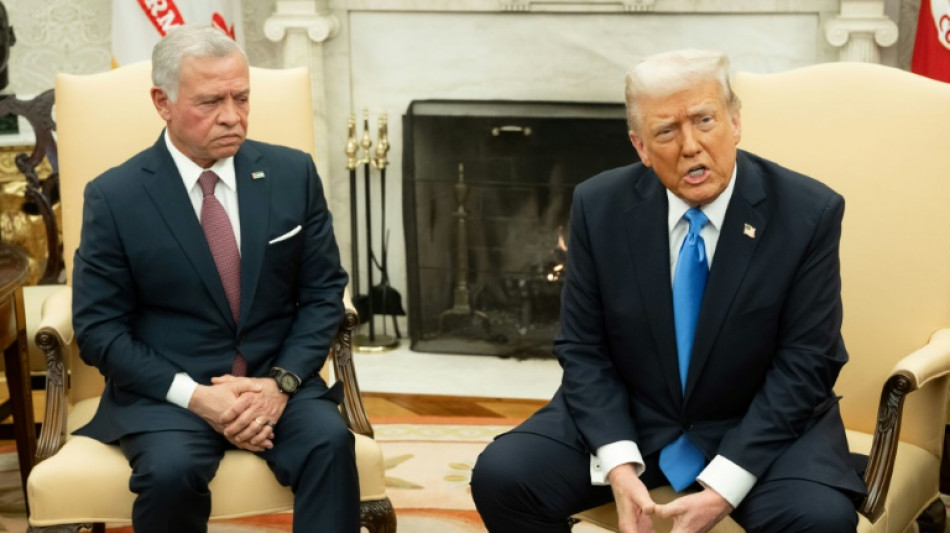
-
 Everton strike late to hold Liverpool in last derby at Goodison Park
Everton strike late to hold Liverpool in last derby at Goodison Park
-
Trump is now head of top Washington cultural venue

-
 Trump says to sign order on reciprocal tariffs today or tomorrow
Trump says to sign order on reciprocal tariffs today or tomorrow
-
White House says American among three detainees freed by Belarus

-
 Argentine MLS striker Acosta traded to Dallas by Cincinnati
Argentine MLS striker Acosta traded to Dallas by Cincinnati
-
Dodgers manager expects Sasaki, Yamamoto to pitch in Tokyo

-
 Penalty row as Club Brugge gain Champions League advantage over Atalanta
Penalty row as Club Brugge gain Champions League advantage over Atalanta
-
Trump blames Biden for unexpected uptick in US inflation

-
 Sleightholme says Six Nations win over France has revived England's self-belief
Sleightholme says Six Nations win over France has revived England's self-belief
-
Israel says could fulfil Trump's Gaza displacement plan if hostages not freed

-
 Burundi warns Rwanda as eastern DR Congo conflict advances
Burundi warns Rwanda as eastern DR Congo conflict advances
-
Chevron to cut 15-20% of workforce by end of 2026: company

-
 Trump says Ukraine talks to start 'immediately' after Putin call
Trump says Ukraine talks to start 'immediately' after Putin call
-
Trump's 25% steel, aluminum tariffs add on to Canada and Mexico duties: W.House

-
 New accuser sues US actor Spacey in UK over sexual abuse claim
New accuser sues US actor Spacey in UK over sexual abuse claim
-
Jordan king faces quagmire over Trump's Gaza proposal

-
 World heavyweight champion Usyk plans two more fights before retiring
World heavyweight champion Usyk plans two more fights before retiring
-
Canadian steel firms face turmoil after US 'stab in the back'

-
 Trump speaks to Putin, says Ukraine talks to start 'immediately'
Trump speaks to Putin, says Ukraine talks to start 'immediately'
-
Bumrah absence a chance for 'world-class' Shami: India coach

-
 Rizwan and Salman smash tons as Pakistan defeat South Africa in record chase
Rizwan and Salman smash tons as Pakistan defeat South Africa in record chase
-
Israel threatens displacement from Gaza if hostages not released Saturday

-
 Fire at Rio de Janeiro carnival costume factory injures 21
Fire at Rio de Janeiro carnival costume factory injures 21
-
England can be 'dangerous' in Champions Trophy despite India loss: Buttler

-
 US releasing Russian crypto kingpin Vinnik in exchange for Fogel: official
US releasing Russian crypto kingpin Vinnik in exchange for Fogel: official
-
Battling Swiatek lines up Doha quarter-final against Rybakina

-
 Van der Poel skips Rwanda road worlds for mountain bike title tilt
Van der Poel skips Rwanda road worlds for mountain bike title tilt
-
Unfinished deepsea observatory spots highest-energy neutrino ever

-
 US trade deficits at core of Trump tariff moves
US trade deficits at core of Trump tariff moves
-
Nuno says Forest FA Cup run can boost Premier League campaign

-
 Hamas rejects US, Israeli 'threats' as mediators push to salvage Gaza deal
Hamas rejects US, Israeli 'threats' as mediators push to salvage Gaza deal
-
Trump's defence chief lays down demands on Ukraine, NATO

-
 Gill ton helps India sweep England in ODI series
Gill ton helps India sweep England in ODI series
-
Hit by Trump, Canada and EU seek comfort in numbers

-
 Scammers using AI to dupe the lonely looking for love
Scammers using AI to dupe the lonely looking for love
-
US consumer inflation unexpectedly up, Trump blames Biden

-
 US stocks fall as inflation unexpectedly heats up
US stocks fall as inflation unexpectedly heats up
-
Shakira kicks off first world tour in seven years

-
 Bankrupt ex-Turkey operator of KFC, Pizza Hut says wages to be paid
Bankrupt ex-Turkey operator of KFC, Pizza Hut says wages to be paid
-
Arsenal's Havertz out for season with torn hamstring - reports

-
 Von Allmen claims second world gold as Swiss sweep team combined
Von Allmen claims second world gold as Swiss sweep team combined
-
Trump's new defence chief pressures allies on first NATO visit

-
 Record-setting Breetzke lifts South Africa to 352-5 in tri series
Record-setting Breetzke lifts South Africa to 352-5 in tri series
-
Motor racing's Jordan leads buy out of cash-strapped London Irish

-
 Southgate's ex-assistant wins first game as Yokohama boss
Southgate's ex-assistant wins first game as Yokohama boss
-
Macron courts Modi in quest for geopolitical 'independence'

-
 New push to salvage Israel-Hamas truce
New push to salvage Israel-Hamas truce
-
Spain prosecutor tells trial 'no doubt' Rubiales kiss 'non-consensual'

-
 Gill ton helps India to 356 in third England ODI
Gill ton helps India to 356 in third England ODI
-
Talks to form Austria's first far-right govt stall


Jordan king faces quagmire over Trump's Gaza proposal
Jordan's King Abdullah II was visibly uncomfortable as he sat across from US President Donald Trump and discussed the fate of over two million Palestinians in Gaza.
Trump's proposed plan to take over Gaza and "clean out" the territory of its Palestinian residents, sending them to Jordan or Egypt, had already sent the region into a tailspin.
But in Tuesday's meeting in Washington, the tension between Trump's vision and the reality that King Abdullah -- whose wife is of Palestinian descent -- has long negotiated was palpable in the exchange between the two leaders.
"The king may be in the most complicated situation of his reign" of more than 25 years, said analyst Labib Kamhawi.
He nonetheless "sought to deal with Trump calmly and not to enter into a direct confrontation with a country that is meant to be an ally", Kamhawi added.
Instead, the king "confirmed the unified Arab stance rejecting the displacement (of Palestinians) and said he would work for the benefit of Jordan and its people", Kamhawi said.
During the meeting, Trump doubled down on his plan, saying Gaza would be placed under "US authority".
In response, King Abdullah released a statement after the meeting in which he "reiterated Jordan's steadfast position against the displacement of Palestinians in Gaza and the West Bank".
- 'Difficult situation' -
"The king was diplomatic and skilled in dealing with Trump's bullishness... without providing any concessions," said Hassan Barari, a professor of international relations at Qatar University.
The British-educated Jordanian monarch appeared to offer a sweetener to Trump, who the day before the visit floated the possibility of halting crucial US aid to both Jordan and Egypt if they did not take in refugees.
"One of the things that we can do right away is take 2,000 children, cancer children who are in a very ill state. That is possible," the king said as Trump welcomed him and Crown Prince Hussein in the Oval Office.
The image of the king on Tuesday was a far cry from his last visit to Washington a year ago when, alongside Queen Rania and Prince Hussein, he was received warmly by former president Joe Biden.
King Abdullah "is in a difficult situation, without a doubt", said Barari, adding that "it is difficult to clash with your first strategic ally in the world and to say no".
But Barari noted that the king had faced little consequence when he expressed his objection to Trump's so-called "Deal of the Century" -- a proposal to solve the Middle East conflict presented during his first term in office and subsequently shelved.
That plan would have effectively paved the way for Israel's annexation of the West Bank, which it already occupies.
- 'Unified Arab position' -
Jordanian newspapers on Wednesday sought to highlight King Abdullah's rejection of Trump's latest proposal, with one headline reading "The king to Trump: no to displacement".
In parallel with public statements, both Amman and Cairo have sought to rally Arab support in a bid to show a unified front to counteract pressure from the Trump administration.
"Jordan is a small country that cannot withstand this storm alone, nor can the king," said Kamhawi.
The analyst added that "for this reason, his words were clear in Washington," where the king relied on his Arab allies, namely Egypt and Saudi Arabia, both of which have strongly rejected any displacement of Palestinians outside of their land.
In his statement rejecting Trump's plan on Tuesday, King Abdullah noted: "This is the unified Arab position."
And on Wednesday, Jordan's royal court issued a statement saying that the king and Egyptian President Abdel Fattah al-Sisi stressed their "shared position" rejecting the forced displacement of Palestinians.
About half of Jordan's population of 11 million people is of Palestinian origin, the majority of whom were displaced during the 1948 war that coincided with the creation of Israel and the 1967 Arab-Israeli war.
At a market in central Amman, vendor Khaled al-Qaisi said of Trump: "This man is saying nonsense... Jordan is our country and we have received enough refugees."
"Trump wants to create an alternative homeland for the Palestinians here... neither the Jordanian people nor the Palestinians can accept that," said the man in his 80s.
R.Adler--BTB
